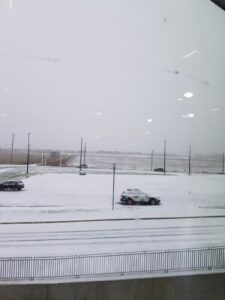
Two climatic events across the globe have once again pointed to the devastating effects of climate change. There has been record-breaking snow across Canada and a major unprecedented bush fire in Australia – both possibly due to climate change.
Places like eastern Ontario and Toronto have been witnessing snow storms that are usually seen in January. This year it has come two months in advance. The weather office has predicted that some areas could see up to 15 centimetres of snow.

In Ottawa, temperatures are around – 8 C with the wind chill making it feel around –16. It could feel as chilly as –20 in some places.
If Canada is going through bone-biting cold, a devastating bush fire has engulfed many places in New South Wales (NSW) in Australia.
“Unprecedented” is a word that has been emerging from fire chiefs, politicians, and the weather bureau. But Australian government refuses to acknowledge that the fires are due to climate change.
In NSW, the worst fire years were almost always during an El Nino event, and major property losses generally occurred from late November to February. Based on more than a century of weather observations the official fire danger season is from October 1 to March 31. During the 2000s though, major fires have regularly started in August and September, and sometimes go through to April.

The October 2013 fires that destroyed more than 200 homes were the earliest large-loss fires in NSW history – again, not during an El Nino.
This year, by the beginning of November, NSW has already lost about as many homes as during the disastrous 2001-2002 bushfire season. The area has now eclipsed 1994 fire losses.
Fires are burning in places and at intensities never before experienced – rain forests in northern NSW, tropical Queensland, and the formerly wet old-growth forests in Tasmania.

The drought the has gripped parts of Australia is more intense than the Millennium Drought, with higher levels of evaporation due to higher temperatures. This has dried out the bush and made it easier for fires to start.
All these are tell-tale signs of climate change.

